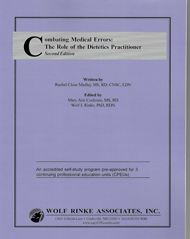|
|
|
|||||||
|
List of All Activities
Share an Activity: Order Form |
||||||||
|
An informative medical errors CPE activity which meets the Florida Licensure requirements. More specifically you will be able to:
Share with a friend and Save! Click here for important information about
sharing.
Combating Medical Errors: The Role of the Dietetics Practitioner, Second Edition © 2024 Wolf Rinke Associates. All rights reserved for this self-directed accredited learning activity. Reproduction in whole or part without written permission, except for brief excerpts, is prohibited. Upon the completion of this accredited, self-directed learning program you should be able to:
ABOUT THE AUTHOR Rachel Close Medlej, MS, RD, CNSC, LDN is a registered dietitian with a Bachelor of Science degree in Dietetics from Syracuse University and a Master of Science degree in Nutritional Sciences from the University of Wisconsin-Madison. She has extensive experience in clinical nutrition and nutrition support. She is currently a senior nutrition support and critical care dietitian at Massachusetts General Hospital in Boston, MA, and has taught medical nutrition therapy at the American University of Beirut in Beirut, Lebanon. If you prefer to order by phone, mail or fax click below Order Formor click here to contact us with other questions. For information about our other products and services return to the sidebar at the top of the page. |
||||||||


